Ke Huy Quan: From Short Round in ‘Indiana Jones’ to Oscar favorite with ‘Everything Everywhere All at Once’
Over two decades after he gave up acting because of a lack of appealing roles, the former child star is one of the awards season’s biggest comeback stories


In 1993, Ke Huy Quan decided he had enough. His Asian heritage meant that casting directors ignored him, and he was experiencing obvious racial discrimination. So, he gave up acting. He went on to work as an assistant director and an action sequence coordinator. Then, two decades later, in 2018, he saw Crazy Rich Asians and thought it was time to return to the other side of the camera. He asked his lawyer-agent, who is also a former child actor, to find a part for him, but that turned out to be unnecessary. Out of the blue, he received an unusual script in which he would play the main character’s husband. Almost three years after shooting the film – the Covid-19 pandemic delayed its release – Quan’s time has come. The actor is a star again. The kid who played Short Round in Indiana Jones and the Temple of Doom and Data in The Goonies is weeks away from possibly winning an Oscar for Best Supporting Actor for his performance in Everything Everywhere All at Once. When he learned of his nomination for an Academy Award, all he could say was “I’m so happy! Aaaaaaaaaaaahhhh!” And he jumped for joy.
Hollywood loves comeback stories, and Quan’s is hard to beat. He was born in Saigon (now Ho Chi Minh City) in 1971, the seventh of nine siblings in a family of Chinese descent. At the end of the Vietnam War, the Quans tried to flee the capital twice. In 1978, they finally succeeded but at the cost of separating the family: his mother left for Malaysia with three children, while his father took five other children, including Ke Huy, to a refugee camp in Hong Kong. Eventually, they received political asylum in the United States and reunited in California in 1979. One day, a casting director showed up at Castelar Elementary School to find children to audition for a role. He chose one of Quan’s younger brothers, who turned out to be too young to film. So, it fell to Quan, who was 12 years old at the time and had never seen a Hollywood movie before. The casting director was looking for a boy with Asian features to play the role of Short Round in Steven Spielberg’s Indiana Jones and the Temple of Doom.
The movie was a huge success. After that, Quan appeared in another Spielberg hit, The Goonies, in which he played Data. At 14, Quan was a Hollywood star, but he had to overcome two obstacles: the transition from child actor to twenty-something and the difficulties of being an Asian actor. He succeeded in the former, but the film industry never offered him roles beyond clichéd Asian parts.
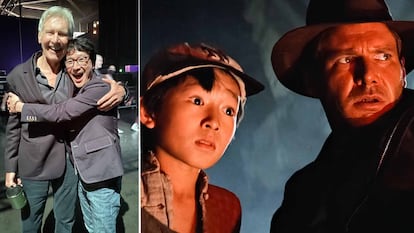
Of the handful of acting jobs Quan had during that period (in Japan’s Passenger and Breathing Fire, Taiwan’s Red Pirate, and a late effort in 2002, Hong Kong’s Second Time Around, as well as in shows like Together We Stand, Head of the Class, and Tales from the Crypt), his most notable role was in Encino Man (1992), where he crossed paths with Brendan Fraser, the other great Oscar comeback story; both remembered their journeys on the verge of tears a few days ago at a Variety magazine roundtable. Quan’s plans to pursue acting after high school fizzled out because of a lack of opportunities, so he studied film at the University of Southern California and earned his degree. Thereafter, his work would be carried out behind the scenes.
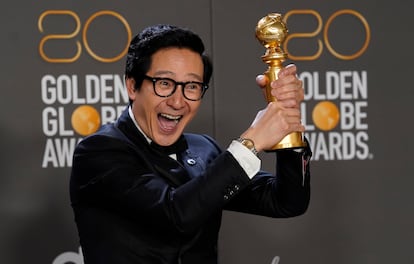
During the filming of Indiana Jones and the Temple of Doom, Quan had learned taekwondo, and during his time as an actor, he became friends with Corey Yuen, a renowned action choreographer. In 1997, Quan was in Los Angeles filming Lethal Weapon 4, and he crossed paths with Yuen, who was there supervising the fight scenes. Quan caught the bug. Yuen was struck by Quan’s burst of passion and recommended that he pursue it as a career. A year and a half later, Yuen called Quan: could he travel to Toronto to shoot a movie called X-Men?
Today, X-Men is a classic of superhero cinema, but at the end of the 20th century it was an anomaly in Hollywood. A 19-second video of Quan choreographing a fight sequence between the stunt doubles of Wolverine and Mystique has gone viral on social media. Quan has been doing that work for the past two decades in films like The One. He also worked as an assistant director on Wong Kar Wai’s 2046 (Quan speaks English, Mandarin, Cantonese and Vietnamese).
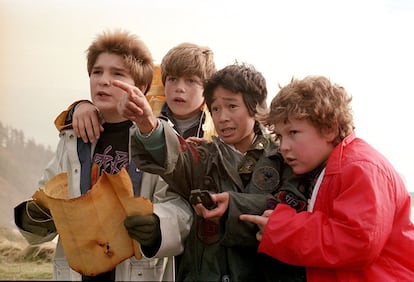
We know very little about Quan’s personal life. He is married but we don’t know if he has children. Over the years, he has kept in touch with Spielberg, who sends him gifts for Christmas, but not with Harrison Ford, with whom he was reunited last September, at the Disney D23 convention. Quan’s lawyer is Jeff Cohen, a former actor who appeared with Quan in The Goonies. The actor asked Cohen to help him return to acting, but the offer of a role in Everything Everywhere All at Once came from the film’s co-director Dan Kwan via Twitter. Coincidentally, the role was Evelyn’s husband, and Evelyn, the movie’s main character, was played by Michelle Yeoh, who appeared in Crazy Rich Asians, the film that alerted Quan to the possibility that Hollywood was changing.
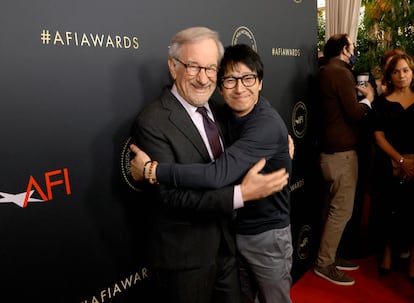
Overcome by emotion
In an interview in early December with the AP agency, before he won the Golden Globe but amid Oscar buzz, Quan acknowledged that he was overcome by emotion. As he explained, “I didn’t think this day would come. It was a day I wanted for so long, for decades. And it’s finally here. When you have a dream and you kind of bury it because you think it won’t come true, to see it finally come true is incredible… I cry a lot,” he says.” He noted that, for years, he only wanted to be an actor and that Everything Everywhere All at Once has taken him even further: it has made him a star again.
He also confessed his fears: “In my late teens and my early twenties, when it was extremely difficult for me to get a job, I never blamed anybody. I thought I was not good enough. I thought I was not tall enough. I thought I was not good-looking enough. I thought perhaps my acting wasn’t good enough, and that’s why I wasn’t landing these roles. And I was really young. I blamed myself. For the longest time, I wished I was better. Hollywood writers were just not writing roles for Asian actors. I didn’t think like that. I struggled with that decision for at least two years. You know, the last audition that I did was for a role with no name, two lines. I walk in the room and there were 30 other Asian actors fighting for this tiny bread crumb. When I didn’t even get that, I didn’t see a future for myself anymore as an actor. I felt like time was just slipping away.” That’s why he kept his return to the big screen to himself: “When I got back into acting, I didn’t tell my family because I’m thinking: ‘If I get fired during production, they won’t know about it.’ Or, ‘If I suck or the movie sucks, they won’t know about it.’ I told them right before our trailer came out.”
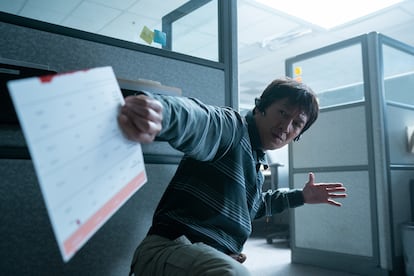
Those fears have remained: Everything Everywhere All at Once was filmed before the pandemic; it took two years for the film to be released. “I couldn’t get a single job. In fact, I lost my health insurance. It was a time where I was at my lowest. And then our movie came out, and it changed everything,” he told Vanity Fair.
Now, Quan has a different fate. His reunion with Ford at D23 was the same day it was announced that Quan would participate in the new season of Loki and the American Born Chinese television series. He has already released Onaha: The Treasure of Hawaii on Netflix, and in December, he filmed the Netflix sci-fi film The Electric State, which is directed by the Russo brothers (the co-producers of Everything Everywhere All at Once) and stars Chris Pratt and Mille Bobby Brown. Now, Ke Huy Quan is unstoppable.
Sign up for our weekly newsletter to get more English-language news coverage from EL PAÍS USA Edition
Tu suscripción se está usando en otro dispositivo
¿Quieres añadir otro usuario a tu suscripción?
Si continúas leyendo en este dispositivo, no se podrá leer en el otro.
FlechaTu suscripción se está usando en otro dispositivo y solo puedes acceder a EL PAÍS desde un dispositivo a la vez.
Si quieres compartir tu cuenta, cambia tu suscripción a la modalidad Premium, así podrás añadir otro usuario. Cada uno accederá con su propia cuenta de email, lo que os permitirá personalizar vuestra experiencia en EL PAÍS.
¿Tienes una suscripción de empresa? Accede aquí para contratar más cuentas.
En el caso de no saber quién está usando tu cuenta, te recomendamos cambiar tu contraseña aquí.
Si decides continuar compartiendo tu cuenta, este mensaje se mostrará en tu dispositivo y en el de la otra persona que está usando tu cuenta de forma indefinida, afectando a tu experiencia de lectura. Puedes consultar aquí los términos y condiciones de la suscripción digital.








































